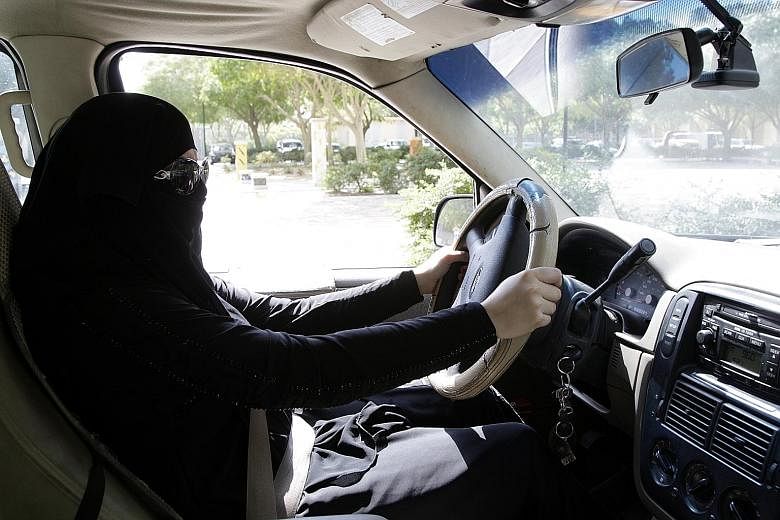RIYADH • Saudi Arabia's historic decision to allow women to drive won plaudits internationally and inside the conservative kingdom, as euphoria mixed with disbelief among activists who long fought the ban.
King Salman's decree, which takes effect next June, is part of an ambitious reform push that runs the risk of a backlash from religious hardliners. Saudi Arabia was the only country in the world to impose a ban on women driving, and its maintenance was seen internationally as a symbol of repression in the Gulf kingdom.
Tuesday's royal decree overturning the ban was the boldest move yet in Crown Prince Mohammed bin Salman's effort to open up Saudi society. It highlights the kingdom's hopes for a public relations benefit from the reform.
Saudi leaders also hope the new policy will help the economy by increasing women's participation in the workplace. Many working Saudi women spend much of their salaries on drivers or must be driven to work by male relatives.
With more than half the country aged under 25, Prince Mohammed, the King's son and the architect of the reforms, is also seen as catering to the aspirations of younger people.
"Allowing women to drive is the biggest PR win that Saudi Arabia - and Prince Mohammed - could have in a single swoop," said Ms Jane Kinninmont of the Chatham House think-tank in London.
-
Vision 2030 drives change
-
RIYADH • The Saudi Arabian government's decision to allow women to drive cars comes as the country's rulers pursue a "Vision 2030" plan that aims to transform the conservative, oil-rich nation.
The plan, masterminded and unveiled by Crown Prince Mohammed bin Salman in April last year, provides a road map for the kingdom's development and economic objectives for the next 15 years.
The biggest social changes to the country come under the strategy for enabling citizens to have "fulfilling lives". The official Vision 2030 website says: "We are well aware that the cultural and entertainment opportunities currently available do not reflect the rising aspirations of our citizens and residents, nor are they in harmony with our prosperous economy."
Keeping this in mind, the government says: "We will seek to offer a variety of cultural venues - such as libraries, arts and museums - as well as entertainment possibilities to suit tastes and preferences."
The promise is a radical departure from the country's strict conservatism and likely to have been a key motivator of the decision to allow women to drive. It aims to increase household spending on cultural and entertainment activities inside the kingdom from the current 2.9 per cent to 6 per cent.
The other big decision taken was to wean Saudi Arabia away from its economic dependence on petroleum.
Under Vision 2030, the government aims to increase non-oil government revenue from 163 billion riyals (S$59 billion) to 1 trillion riyals. One of the landmark steps in this direction will be the forthcoming initial public offering of national oil firm Saudi Aramco, which is expected to become the most valuable company in the world.
The government has also committed to raise the country's ranking in the Government Effectiveness Index, from 80 to 20, as well as its ranking on the E-Government Survey Index from 36 last year to be among the top five nations.
It also aims to increase citizens' average life expectancy from 74 to 80 years.
Already viewed as the de facto ruler controlling all the major levers of government, Prince Mohammed, 32, is seen as stamping out internal dissent before any formal transfer of power from his 81-year-old father.
His gambit to loosen social restrictions - which has so far not translated into more political or civil rights - seeks to ease criticism over recent arrests, some analysts say.
Over two dozen people, including influential clerics and activists, were arrested this month, in what critics called a coordinated crackdown.
Prince Mohammed has already upended Saudi Arabia's traditionally cautious foreign policy and outlined radical changes to the economy, including a proposed share sale in state oil company Saudi Aramco.
US President Donald Trump welcomed the move to end the ban as "a positive step towards promoting the rights and opportunities of women in Saudi Arabia". British Prime Minister Theresa May called it an "important step towards gender equality".
Saudi Arabia will use the "preparatory period" until June to expand licensing facilities and develop infrastructure to accommodate millions of new drivers, state media said.
Conservative clerics in Saudi Arabia, an absolute monarchy ruled according to Islamic syariah law, have long opposed lifting the ban, arguing that it would lead to promiscuity. One of them even claimed that driving harmed women's ovaries.
The announcement comes after decades of resistance from female activists, many of whom were jailed for flouting the prohibition.
"A glorious day. Can't hold back my tears," tweeted Saudi shura council member Latifah Alshaalan. "Congratulations to the women of my homeland."
Activist Manal al-Sharif, who led the 2011 Women2Drive protest movement, tweeted: "Today, the last country on earth to allow women to drive... We did it."
Human rights watchdog Amnesty International said: "It is a testimony to the bravery of women activists who have been campaigning for years that... Saudi Arabia has finally relented and decided to permit women to drive."
AGENCE FRANCE-PRESSE, BLOOMBERG, NYTIMES

